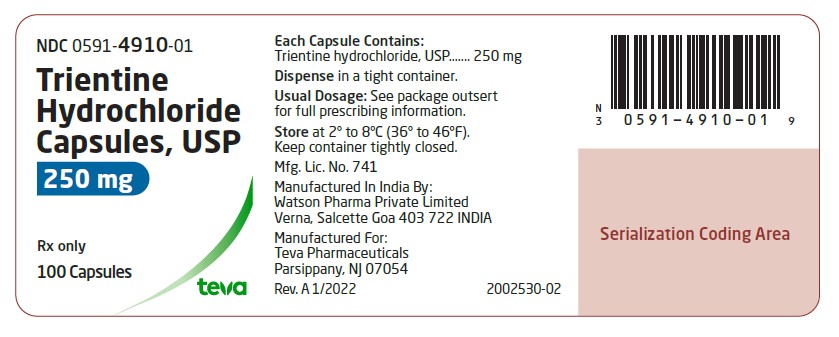Drug Catalog - Product Detail
TRIENTINE 250MG CAPSULES 100
| NDC | Mfr | Size | Str | Form |
|---|---|---|---|---|
| 00591-4910-01 | ACTAVIS PHARMA | 100 | 250MG | CAPSULE |
PACKAGE FILES

Generic Name
TRIENTINE HYDROCHLORIDE
Substance Name
TRIENTINE HYDROCHLORIDE
Product Type
HUMAN PRESCRIPTION DRUG
Route
ORAL
Application Number
ANDA207567
Description
DESCRIPTION Trientine hydrochloride, USP is N,N' -bis (2-aminoethyl)-1,2-ethanediamine dihydrochloride. It is a white to pale yellow crystalline hygroscopic powder. It is freely soluble in water, soluble in methanol, slightly soluble in ethanol, and insoluble in chloroform and ether. The empirical formula is C 6 H 18 N 4 •2HCl with a molecular weight of 219.2. The structural formula is: NH 2 (CH 2 ) 2 NH(CH 2 ) 2 NH(CH 2 ) 2 NH 2 •2HCl Trientine hydrochloride, USP is a chelating compound for removal of excess copper from the body. Trientine hydrochloride, USP is available as 250 mg capsules for oral administration. Trientine hydrochloride capsules, USP contain black iron oxide, gelatin, potassium hydroxide, propylene glycol, shellac, stearic acid and titanium dioxide as inactive ingredients.
How Supplied
HOW SUPPLIED Trientine hydrochloride capsules, USP 250 mg, are white to off-white opaque hard gelatin capsules radially printed “A272” on the cap with black ink and body is plain. They are supplied as follows: NDC 0591-4910-01 in bottles of 100. Storage Store at 2° to 8°C (36° to 46°F). Keep container tightly closed. Manufactured In India By: Watson Pharma Private Limited Verna, Salcette Goa 403 722 INDIA Manufactured For: Teva Pharmaceuticals Parsippany, NJ 07054 Rev. A 1/2022
Indications & Usage
INDICATIONS AND USAGE Trientine hydrochloride is indicated in the treatment of patients with Wilson's disease who are intolerant of penicillamine. Clinical experience with trientine hydrochloride is limited and alternate dosing regimens have not been well-characterized; all endpoints in determining an individual patient's dose have not been well defined. Trientine hydrochloride and penicillamine cannot be considered interchangeable. Trientine hydrochloride should be used when continued treatment with penicillamine is no longer possible because of intolerable or life endangering side effects. Unlike penicillamine, trientine hydrochloride is not recommended in cystinuria or rheumatoid arthritis. The absence of a sulfhydryl moiety renders it incapable of binding cystine and, therefore, it is of no use in cystinuria. In 15 patients with rheumatoid arthritis, trientine hydrochloride was reported not to be effective in improving any clinical or biochemical parameter after 12 weeks of treatment. Trientine hydrochloride is not indicated for treatment of biliary cirrhosis.
Dosage and Administration
DOSAGE AND ADMINISTRATION Systemic evaluation of dose and/or interval between dose has not been done. However, on limited clinical experience, the recommended initial dose of trientine hydrochloride is 500 to 750 mg/day for pediatric patients and 750 to 1250 mg/day for adults given in divided doses two, three or four times daily. This may be increased to a maximum of 2000 mg/day for adults or 1500 mg/day for pediatric patients age 12 or under. The daily dose of trientine hydrochloride should be increased only when the clinical response is not adequate or the concentration of free serum copper is persistently above 20 mcg/dL. Optimal long-term maintenance dosage should be determined at 6 to 12 month intervals (see PRECAUTIONS, Laboratory Tests ). It is important that trientine hydrochloride capsules be given on an empty stomach, at least one hour before meals or two hours after meals and at least one hour apart from any other drug, food, or milk. The capsules should be swallowed whole with water and should not be opened or chewed.
